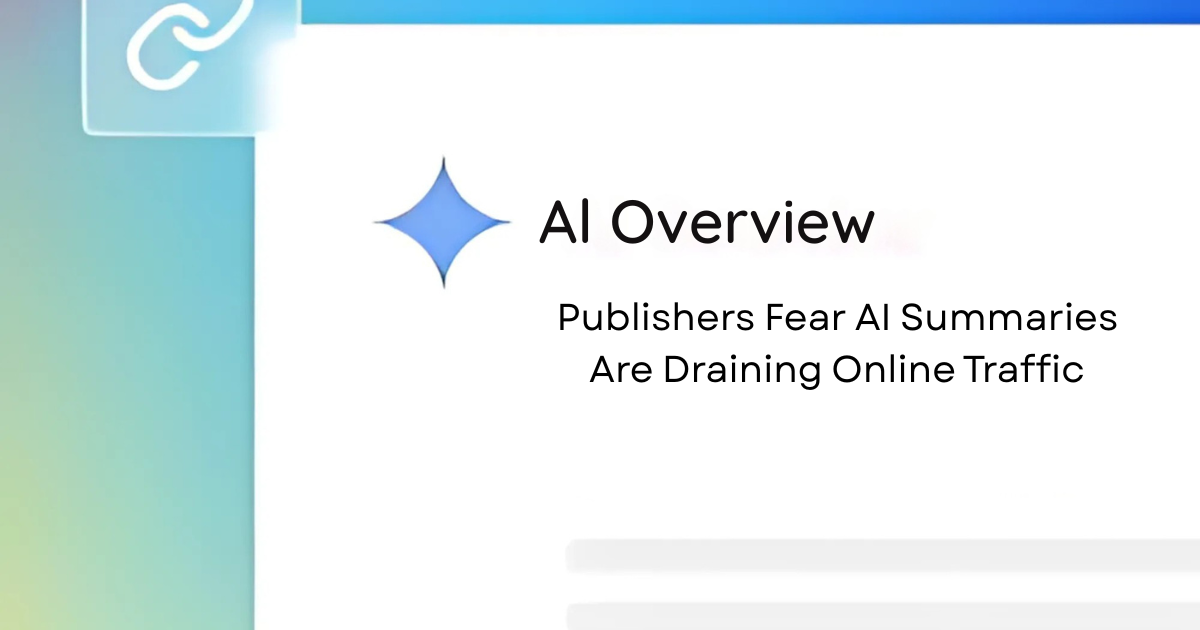AI Overviews Blamed for Falling Traffic to Publisher Sites
When actress Sorcha Cusack exited the BBC drama Father Brown in January, the story made national headlines — including coverage across Reach-owned titles such as The Mirror and the Daily Express.
But unlike in previous years, the article didn’t generate the same level of engagement. According to Reach, the decline was due to Google’s AI Overviews (AIO).
Instead of clicking through to read the full article on Reach’s platforms, many users found the AI-generated summary at the top of Google’s search results sufficient. This shift highlights the growing challenge publishers face as AI-driven search experiences divert readers away from original journalism.
#1Publishers Warn: Google’s AI Overviews Threaten Click-Through Traffic
The rise of Google’s AI Overviews (AIO) is causing growing concern among newspapers and media publishers, who are already struggling after much of their advertising revenue was diverted by social media platforms.
In today’s tough media market, search traffic from Google remains a vital lifeline. But experts warn that AI-generated summaries at the top of search results may drastically reduce the number of users clicking through to original news content.
“A major worry, backed by some individual datapoints, has been that AI overviews would lead to fewer people clicking through to the content behind them, with negative knock-on effects for publishers,” explains Dr. Felix Simon, research fellow in AI and news at the Reuters Institute for the Study of Journalism, University of Oxford.
Measuring the full impact remains difficult, as neither Google nor publishers have shared independent data on click-through rates. Still, the warning signs are stark: DMG Media — owner of MailOnline and Metro — reported that AIOs led to an 89% decline in click-throughs, according to a statement submitted to the UK Competition and Markets Authority (CMA) in July.
#2Publishers Say Google’s AI Tools Threaten Fair Compensation
News publishers argue they are not being fairly compensated for the content that fuels Google’s platforms, says David Higgerson, Chief Digital Publisher at Reach.
“Publishers provide accurate, timely, and trustworthy content that basically powers Google. In return, we get a click — something we can hopefully monetize through ads or subscriptions. But with Google AI Overviews, that need to click through is reduced, and publishers see no financial benefit,” Higgerson explained.
He added:
“It’s another example of the distributor of information not being the creator of information — yet taking all the financial reward.”
The concerns don’t stop there. Google is also testing a feature called AI Mode, which presents search results in a conversational format — with significantly fewer links than traditional search results.
“If Google flips fully to AI Mode, and user adoption is high, the impact could be devastating for the news industry,” Higgerson warned.
#3Publishers Brace for Fewer Clicks as Google AI Expands
“We are definitely moving into the era of lower clicks and lower referral traffic for publishers,” says Stuart Forrest, Global Director of SEO for Digital Publishing at Bauer Media.
Forrest explains that over the past decade, Google has steadily added more features to the SERP (Search Engine Results Page), reducing the need for users to click through to publishers’ websites. “That is the challenge we as a sector face,” he notes.
So far, Bauer Media — which owns leading brands like Grazia and Empire — has not recorded a measurable decline in traffic from Google’s new AI Overview panels. But Forrest warns that the real impact may come later.
“I absolutely think that as time goes on, as consumers get used to these panels, it’s without doubt going to be a challenge. We are absolutely behaving as if we have to respond to that threat.”
Google, however, defended its approach. A spokesperson said:
“More than any other company, Google prioritizes sending traffic to the web, and we continue to send billions of clicks to websites every day.”
#4Google Defends AI Overviews, Says Website Clicks Remain "Stable"
In an August blog post, Google’s Head of Search Liz Reid pushed back against publishers’ concerns over declining traffic caused by AI Overviews. She stated that the overall volume of clicks from Google Search to websites has remained “relatively stable” year-over-year.
Reid also highlighted that the quality of clicks — when a user stays on a page rather than immediately clicking back — had actually improved compared to last year.
“With AI Overviews, people are searching more and asking new questions that are often longer and more complex,” Reid explained. “In addition, with AI Overviews, people are seeing more links on the page than before. More queries and more links mean more opportunities for websites to surface and get clicked.”
Google maintains that its AI-powered search experience could ultimately generate more traffic opportunities for publishers, despite ongoing skepticism in the media industry.
#5Publishers Take Legal Action Over Google AI Overviews
Some in the publishing industry are now turning to the courts in a bid to protect their content.
In July 2024, a coalition including the Independent Publishers Alliance, digital rights non-profit Foxglove, and the campaign group Movement for an Open Web filed a legal complaint with the UK’s Competition and Markets Authority (CMA). The complaint alleges that Google AI Overviews unfairly uses publishers’ content without proper compensation, causing significant harm to newspapers and online media outlets.
The coalition is urging the CMA to introduce interim measures that would prevent Google from “misusing” publisher content in its AI-generated responses.
In the meantime, publishers are experimenting with strategies to ensure their content is featured in AI Overviews (AIO) — hoping to secure at least some level of click-through traffic despite the shift in how users consume information.
#6Publishers Adapt Strategies Amid Google AI Overviews
Publishers say that adapting to Google’s AI Overviews is an ongoing challenge, with no clear roadmap.
“Google doesn’t give us a manual on how to do it. We have to run tests and optimise copy in a way that still serves the reader’s need for information,” explains David Higgerson, chief digital publisher at Reach.
Others stress the importance of high-quality content as the key to visibility. “We need to make sure it’s us being cited and not our rivals. It’s surprising how many publishers just give up on that,” adds Stuart Forrest, global director of SEO at Bauer Media.
Like many in the industry, Reach is exploring alternative traffic sources beyond search. “We need to find audiences elsewhere and build relationships with them. Millions already receive our WhatsApp alerts. We’ve built newsletters. It’s about giving people what they want when they’re with us, so the next time they look for news, they come directly to our platform, not via a third party,” says Higgerson.
BY: BBC







